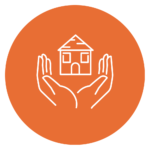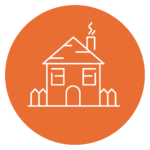Frequently asked questions
- What should I do if someone I know is experiencing domestic or family violence?
- How do I report an incident of domestic or family violence?
- How do I get into a Starick refuge?
- What can I take with me to the refuge?
- Can I bring my pet to the refuge?
- How long can I stay at the refuge?
- How does witnessing domestic violence affect children?
- What is outreach?
- What is a child advocate?
- What is a women's advocate?
- What is a domestic violence advocate?
- What is HOWIC?
- What is a housing cluster?
What should I do if someone I know is experiencing domestic or family violence?
If someone you know is in immediate danger, call the police now on 000.
If the situation is not urgent, the most important thing you can do is to listen without judging, respect the person's decisions and help them find ways to become stronger and safer.
Things you can say to the victim:
- 'I believe you.'
- 'You do not deserve to be abused.'
- 'I am afraid for your safety and the safety of your children.'
- 'Do you need help to find out what services are available?'
How do I report an incident of domestic or family violence?
Phone the police on 131 444. People with hearing impairments can call TTY 106.
Information the police may ask you for:
- The address where the incident is taking place
- Your name and telephone number
- The offender's name, age and date of birth
- If there any weapons involved.
- A description of the abuser.
- The victim's name
If the incident is occurring while you are talking to the operator, stay on the telephone. Your safety is paramount to the police.
How do I get into a Starick refuge?
Starick's crisis accommodation can be accessed by phoning the 24-hour phone number – 08 9458 1107. Women can phone our refuge direct or go through Crisis Care on 08 9223 1111 or 1800 199 008 (country free call).
What can I take with me to the refuge?
If you have the time, you should take:
- Essential clothing and personal items for yourself and your children.
- Any medications you or your children are taking.
- Identification, such as birth certificates, children's immunisation records, any Department of Housing documentation, legal documents, passports and visa information you may have.
Sometimes when women are not able to bring the above items with them, our workers can assist them to retrieve important items from their property with police assistance.
Can I bring my pet to the refuge?
Unfortunately pets cannot be brought to the refuges.
Cats: The Cat Haven may be able to offer temporary accommodation for cats. This is decided case-by-case and depends on space. For more information, visit The Cat Haven website or phone (08) 9442 3600.
Dogs: Temporary care of dogs may be available through Pat Giles Centre's Safe Families Safe Pets (SFSP) Program. For more information, visit the SFSP website or phone (08) 9300 0340.
How long can I stay at the refuge?
Women and children are able to stay up to three months. This gives them time to sort out income and legal issues and to find alternative accommodation.
How does witnessing domestic violence affect children?
Domestic and family violence can affect children in many ways. It can affect their behaviour, development, physical health, relationships, emotions, learning and thinking abilities. How quickly and completely children recover depends on many things, including their individual personalities and strengths. If you'd like to discuss this with our outreach worker, call (08) 9398 5039.
What is outreach?
Outreach is the name we give to any service we provide to women and children living in the community and not in a Starick refuge. Outreach services include things like counselling, referral to support groups, court support and safety planning. Starick has dedicated outreach workers who can assist you with using these services. More details.
What is a child advocate?
Starick's child advocates are trained professionals who assist and support the children using our service. Starick recognises that children need their own advocate to ensure they receive the best possible outcome.
What is a women's advocate?
Starick's women's advocates are trained professionals who assist and support the women using our service.
What is a domestic violence advocate?
Starick's domestic violence advocates work in police stations, providing assistance and support to women who have come into contact with the police or court system because of a family and domestic violence incident. More details.
What is HOWIC?
HOWIC stands for Housing of Women in the Community. This Starick program provides transitional medium to long term housing in the south-east metropolitan area for women and children who are escaping domestic and family violence and who would otherwise have difficulty securing safe, affordable housing. More details.
What is a housing cluster?
Some of our transitional housing is located within a small complex, or cluster. More details.




